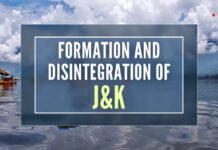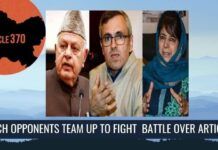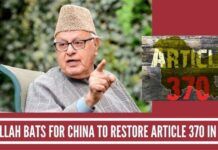
On the Plebiscite front in J&K
[dropcap color=”#008040″ boxed=”yes” boxed_radius=”8px” class=”” id=””]Y[/dropcap]es, it is true that Jawaharlal Nehru, India’s first Prime Minister in the post-Independence era, promised plebiscite for Jammu & Kashmir State in a broadcast to the nation on All India Radio. ‘The Express Tribune Blogs’ dated that broadcast as having happened on November 2, 1947, written by Gopher Giuliani (published on October 9, 2016)
India’s pledge to hold a plebiscite in Kashmir on whether it should accede to India or Pakistan “is not merely a pledge to your government but also to the people of Kashmir and to the world.”
Citing page 45 of a White Paper on Jammu and Kashmir, the above blog quotes Nehru as having said “Let me make it clear that it has been our policy all along that where there is a dispute about the accession of a State to either Dominion, the decision must be made by the people of the State. It was in accordance with this policy that we added a proviso to the Instrument of Accession of Kashmir.”
Nehru also quoted in his broadcast that “We have declared that the fate of Kashmir ultimately has to be decided by the people. That pledge we have given, and the Maharaja (Maharaja Hari Singh) has supported it, not only to the people of Kashmir but to the world. We will not, and cannot, back out of it.”
[dropcap color=”#008040″ boxed=”yes” boxed_radius=”8px” class=”” id=””]P[/dropcap]rior to his broadcast on All India Radio, Nehru had assured the Prime Minister of Pakistan, Liaquat Ali Khan, on October 31, 1947, that India’s pledge to hold a plebiscite in Kashmir on whether it should accede to India or Pakistan “is not merely a pledge to your government but also to the people of Kashmir and to the world.”
And, going by page 27 A.G.Noorani’s book The Kashmir Dispute: 1947-2012’, the above commitment of Nehru was a sequel to what Mahatma Gandhi is reported to have said on his visit to Srinagar in August 1947 to the effect that “No hesitation in saying that the will of the Kashmiris was the supreme law in Kashmir and Jammu.”
But it is totally wrong to blame Nehru, with all his personal and political faults, for J&K having left without the promised plebiscite. The fault lies entirely, instead, with
(i) Pakistan, for not accepting and acting on the United Nations Security Council Resolution 47 of April 21, 1948 that asked India to appoint a plebiscite administrator nominated by the United Nations who would conduct a free and impartial plebiscite after Pakistan to withdraw all its fighting forces from the J&K territory
(ii) Sheikh Abdullah’s National Conference, the biggest political party in J&K, with its demand, on August 5, 1939, demanding rebelling against the existing system of royalty’s “Irresponsible Government” which in that State which could not cure the ills of the people, and instead demanding a Constitutional advance in the governance. This utter aversion for a monarchical regime first pressurized the J&K Maharaja Bahadur to promulgate the Constitution Act, 1939, then led Maharaja Hari Singh to promise, on March 5, 1948, to give the people of the State the right to have a Constituent Assembly for the purpose of framing a Constitution — even as India’s complaint against the Pakistani aggression in Srinagar was being heard in the United Nations. Finally, on 1st May 1951, Yuvraj Karan Singh announced democratic elections based on universal franchise across the entire State for the formation of a Constituent Assembly to enact a full-fledged Constitution for Jammu & Kashmir State separate from the Constitution of India framed in 1950. (Source: “The Constitution of Jammu & Kashmir” by a former Chief Justice of J&K High Court and Chief Justice of India Adarsh Sen Anand, who based his book on his doctoral thesis accepted by Faculty of Law of University of London in April 1963 with revisions from time to time according developments on the ground.)
[dropcap color=”#008040″ boxed=”yes” boxed_radius=”8px” class=”” id=””]A[/dropcap]nd it was this Constituent Assembly that enacted, on 7th in November 1956, the State Constitution in which Section 3 stated that “The State of Jammu and Kashmir is and shall be an integral part of the Union of India.” What’s more, that Section was made constitutionally non-amendable. Further, it had Section 4 which defined the territory of J&K to include what is today called Pak-Occupied Kashmir and which Pakistan has, since its 1947 war with India, dubbed as “Azad Kashmir”.
Under these circumstances, the Plebiscite demand for J&K stands submerged fathoms deep in mother Ganga. And we must thank the fact that Nehru’s government filed its complaint against Pakistan’s 1947 Kashmir aggression under Chapter VI of the UN Charter which makes the April 1948 Resolution non-mandatory on the parties to the dispute. If that complaint had, instead, been filed under Chapter VII of the UN Charter, the Plebiscite would have been a reality since 1948 with all its uncertainties of outcome. Come to think of it, thanks are also due to Sheikh Abdullah for ultimately giving us a J&K State that, whatever Pakistan and its “separatist” agents might cry hoarse about, remains and shall remain an integral part of India.
Note:
1. Text in Blue points to additional data on the topic.
2. The views expressed here are those of the author and do not necessarily represent or reflect the views of PGurus.
- To Editors’ Guild; May we also have our say… please? - July 17, 2019
- Farooq Sahab is either down with dementia or he is a congenital liar? - July 8, 2019
- Shah Bano, Muslims in gutter &Zakaria’s secularism - June 30, 2019











By making a constitutionally non amendable act, centre can abolish section 370 and get rid of the head ache permanently.